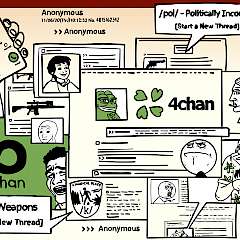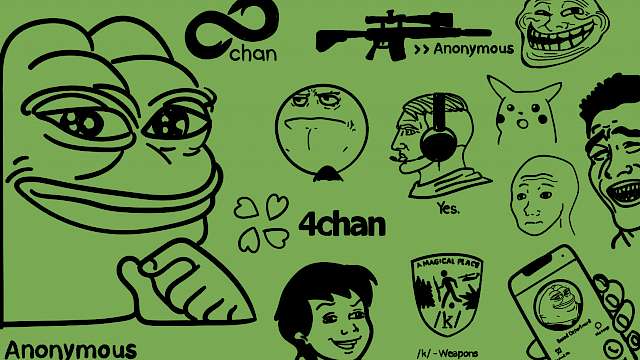The notorious imageboard 8chan was taken offline in August 2019 after several far-right attacks revealed a connection to the site – most notably, the terrorist attack in Christchurch, New Zealand in March 2019, which left 51 people dead. A few months later in November 2019, a site known as 8kun was launched as a replacement, boasting similar freedoms and owned by the same person, Jim Watkins ...
The rise of 8chan
8chan was founded in late 2013 by Fredrick Brennan and began to achieve popularity in 2014 by pitching itself as an alternative to the popular imageboard 4chan.
8chan boasted less oversight and subsequently more freedom for its users; its home page banner stating: “Welcome to 8chan, the Darkest Reaches of the Internet” as well as the slogan “Embrace infamy.”
The tone of its messaging was clear – 8chan was a place to be truly unfiltered.

According to Wired, user migration to 8chan was significant, going from roughly 10 posts a day in 2013 to around 5,000 an hour by the end of 2014.
Despite a disclaimer advising that content violating the Digital Millennium Copyright Act or other United States laws would be deleted, the site quickly became a free for all, permitting racist, sexist and homophobic content, as well as graphic and offensive imagery, in particular on its /pol/ (politically incorrect) board.
A spate of far-right violence
In 2019, 8chan went from being a relatively parochial phenomenon – only really known and understood by those who were already embedded within chan cultures – to making global headlines in the aftermath of the March 2019 terrorist attacks in Christchurch, New Zealand.
The attacker, Brenton Tarrant, posted his final message to 8chan, in which he addressed the “lads” in a message informing the community of an imminent “attack against the invaders.” In addition to this, he linked to a Facebook live stream of the attacks along with his manifesto entitled ‘The Great Replacement’, in a nod to the popular far-right conspiracy theory which holds that indigenous European (white) populations are being replaced by non-European immigrants.

The attack on the Chabad of Poway synagogue in San Diego in April 2019 similarly implicated 8chan, with the attacker, John Earnest, posting to its /pol/ board and providing a link to his manifesto and a failed live stream of the attack. In this manifesto, Tarrant’s Christchurch attack was described as a “catalyst”.
Then, in August 2019, 22 people of predominately Hispanic heritage were killed in a Walmart store in El Paso, Texas, by the gunman, Patrick Crusius, who once more uploaded his manifesto to 8chan, in which he justified his attack as a “response to the Hispanic invasion of Texas” while asserting Tarrant’s manifesto as a primary influence.
8chan was a place to be truly unfiltered
Shortly afterwards, the web infrastructure company Cloudfare took the decision to terminate 8chan’s services, with a spokesperson stating: “they have proven themselves to be lawless and that lawlessness has caused multiple tragic deaths”, therein making the site vulnerable to DDoS attacks and compromising its ability to operate on the Clearnet.
Despite 8chan’s owner Jim Watkins’ September 2019 testimony to the U.S. Committee on Homeland Security, in which he defended 8chan’s existence as a bastion of the First Amendment, the site has remained offline – casting its userbase into the wilderness and in search of a new online home.
8kun: A new home for 8chan’s user base?
8chan returned in early November under the name of 8kun, with Jim Watkins remaining at the helm. Visually, the two were comparable, although the motto at the top of its home page struck a somewhat humbler tone than that of its predecessor, with the words “Speak freely – speak legally”.
Most notably, 8kun did not import the infamous /pol/ board – in its place creating the /pnd/ board which stood for ‘Politics, News, Debate’.
Broadly, /pnd/ continues to host discussions relating to current events, much of which is imbued with the familiar 8chan rhetoric of hate speech and bigotry, particularly towards women, religious and ethnic minorities, and the LGBTQ community.

Findings from this project’s full report, 'Memetic Irony and the Promotion of Violence within Chan Cultures', reveal that events in 2020 surrounding Covid-19 and Black Lives Matter catalysed hateful and extremist content online, which was demonstrated within the visual culture of 8kun and its reinforcement of racist and misogynistic narratives.
In some instances, 8kun users saw global events as an opportunity to accelerate discord and violence in the United States and beyond via the promotion of ‘race war’.
What has not been observed, however, is the explicit use of 8kun to post final messages, manifestos, and live streams of far-right attacks (as seen with 8chan in 2019), although past attacks and attackers are heavily glorified, as they were on 8chan prior to its closure.
Nevertheless, there appears to be a growing feeling among chan users that 8kun is a poor substitute to its predecessor.
Complaints have included a number of technical issues relating to the site’s performance and appearance, in addition to the fact that several boards (including /pol/) did not migrate over to the new site. This is because unlike 8chan, not everybody is able to create a board and has to get them approved by the site’s administrators, which appears to go against the free speech ethos that was so fundamental to 8chan’s culture.
there appears to be a growing feeling among chan users that 8kun is a poor substitute to its predecessor
Thus, 8kun appears to lack the subcultural ‘cool’ that 8chan once boasted and has been rejected by many within the audience it was intended for. Evidence has also shown that a number of original 8chan users initially moved to other platforms, such as Discord and Telegram.
Additionally, 8kun’s owner, Jim Watkins, has been garnering attention in recent months relating to the QAnon conspiracy theory, with some claiming that he is in fact responsible for Q’s posts due to the discovery that 8kun.top has the same IP address as QMap.pub, which is the most popular aggregator of Q’s information drops.
While there is no hard evidence to suggest that Watkins is actually Q, the connection between the two has contributed to the belief that 8kun is actively promoting the QAnon conspiracy theory and that Watkins is profiting off it – which many of 8chan’s original user base are uninterested in, viewing this as largely a ‘boomer’ obsession. Fundamentally, the site’s association with QAnon has further contributed to the notion that it lacks the ‘coolness’ of 8chan.
In October 2020, 8kun briefly went offline after having its DDoS protection services revoked by the Oregon-based cybersecurity company CNServers. However, it returned almost immediately after switching over to the Russian company ddos-guard.net; demonstrating the ability of such imageboards to preserve themselves in the face of takedowns.
Conclusion
When a site such as 8chan gets de-platformed, researchers, policymakers and practitioners will understandably attempt to map where its user base flocks to – and thus, the existence of 8kun and its position in the far-right ecosystem will rightly continue to draw our attention.
However, despite the aesthetic similarities between the two, 8kun does not appear to be a like-for-like replica in terms of the content that it hosts and its users’ grievances with it.
Of course, each individual participant in chan culture will have their own opinion, and it is ultimately difficult to gauge an accurate picture of 8chan’s user base versus 8kun’s.
In light of the hateful content witnessed on 8kun’s /pnd/ board over the course of 2020, we should not immediately discount the site as a contributing factor in the promotion of violence and as a continued place for 8chan’s former user base to congregate around. However, this could just as easily be the case on more niche chans as well as other popular apps, such as Discord and Telegram.
What is evident is that almost a year into 8kun’s creation, the general attitude towards the site is wholly different to that of 8chan – in that the primary audience it was created for has largely rejected it as a less important and relevant site within chan culture.
Copyright Information
As part of CREST’s commitment to open access research, this text is available under a Creative Commons BY-NC-SA 4.0 licence. Please refer to our Copyright page for full details.
IMAGE CREDITS: Copyright ©2024 R. Stevens / CREST (CC BY-SA 4.0)






